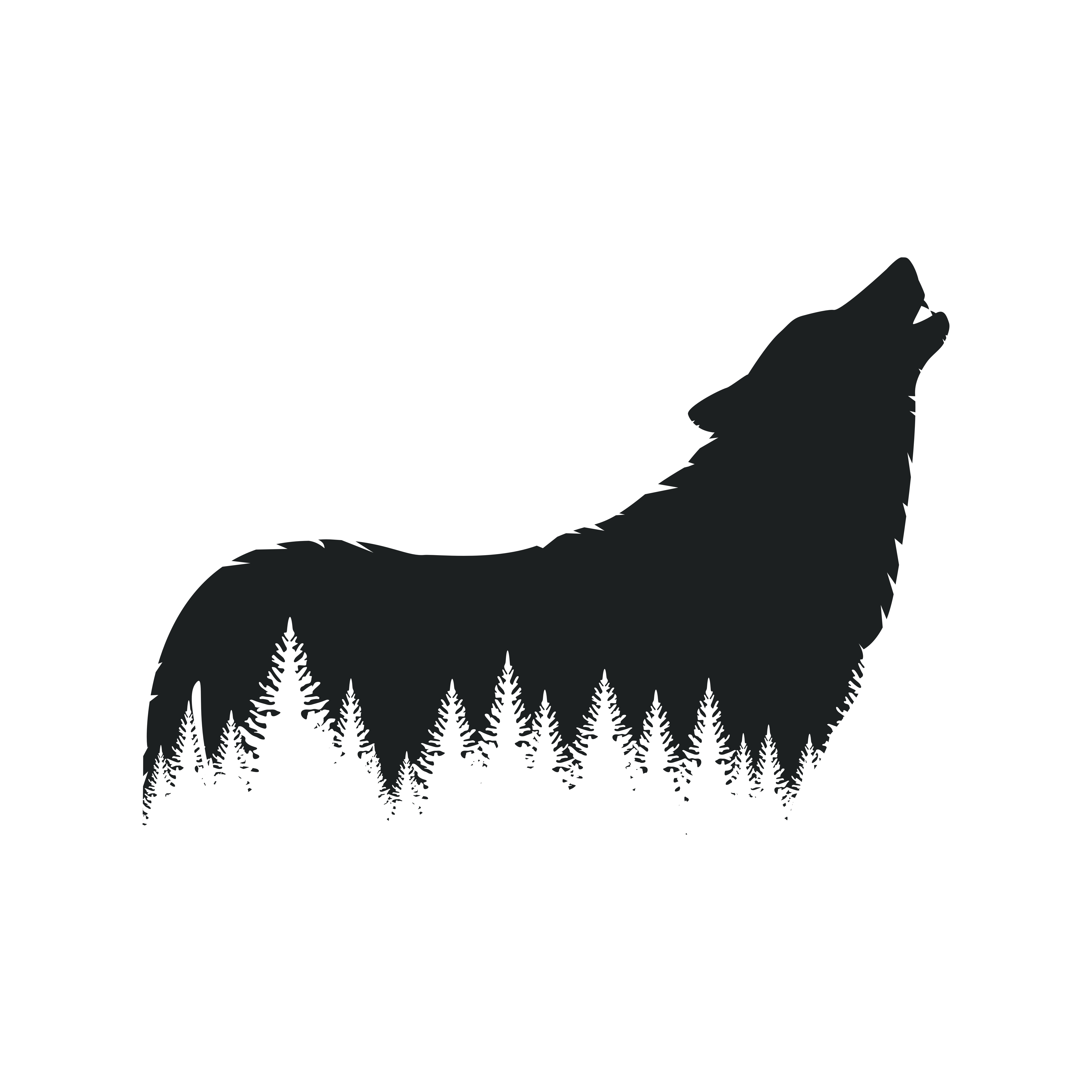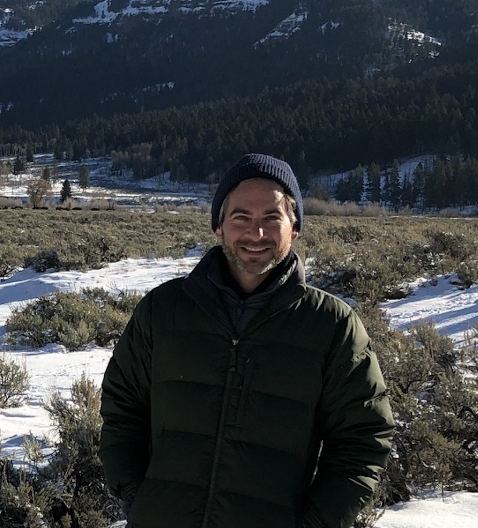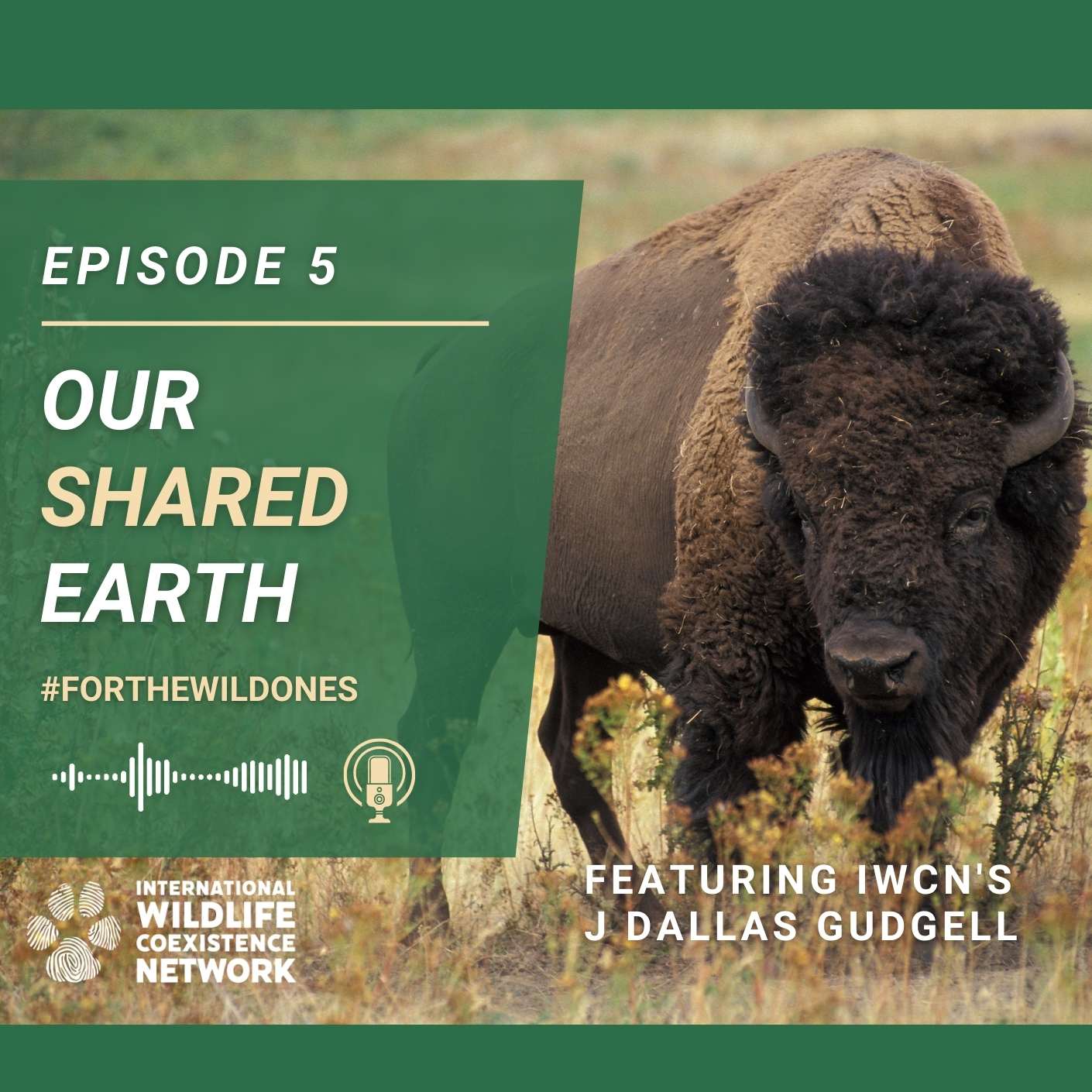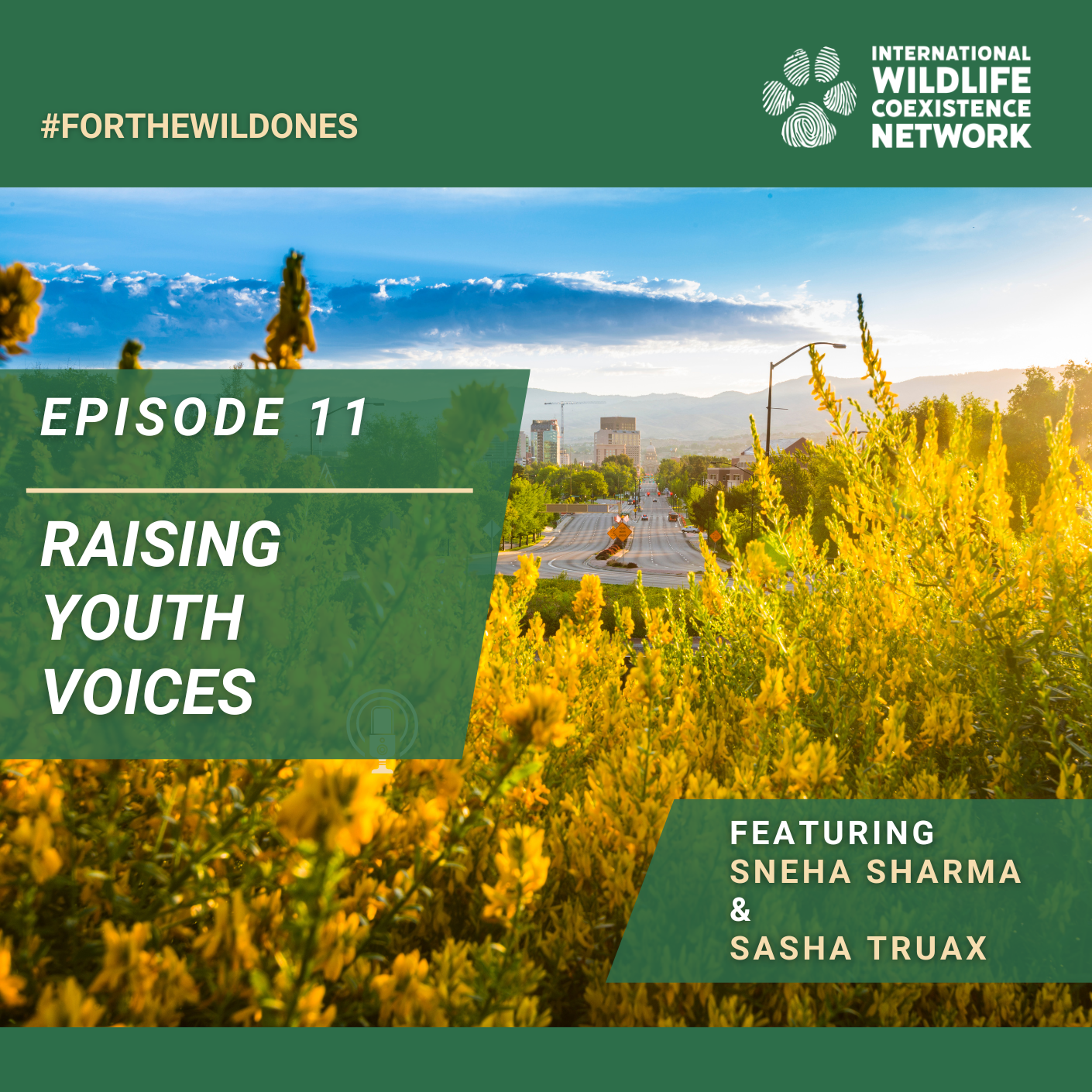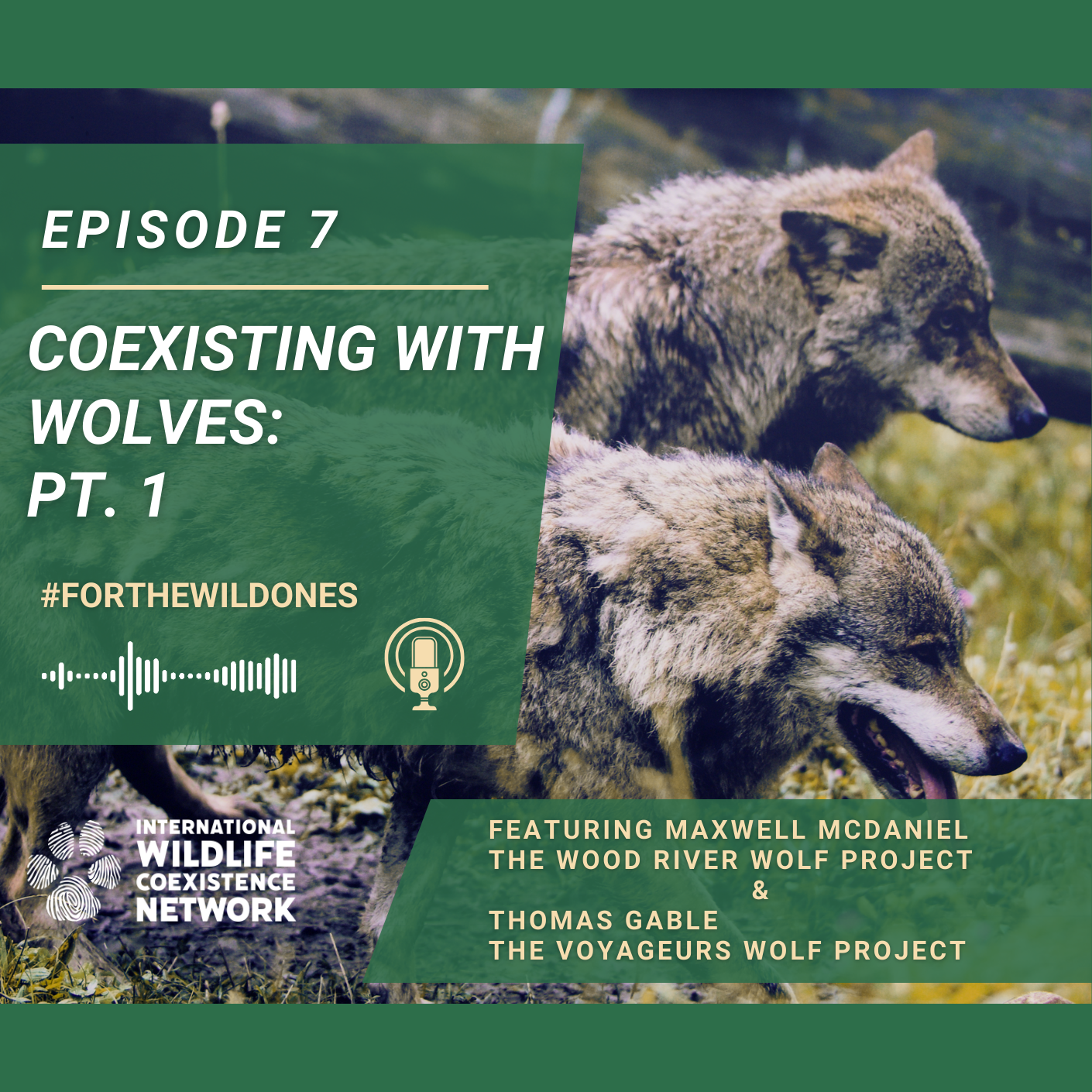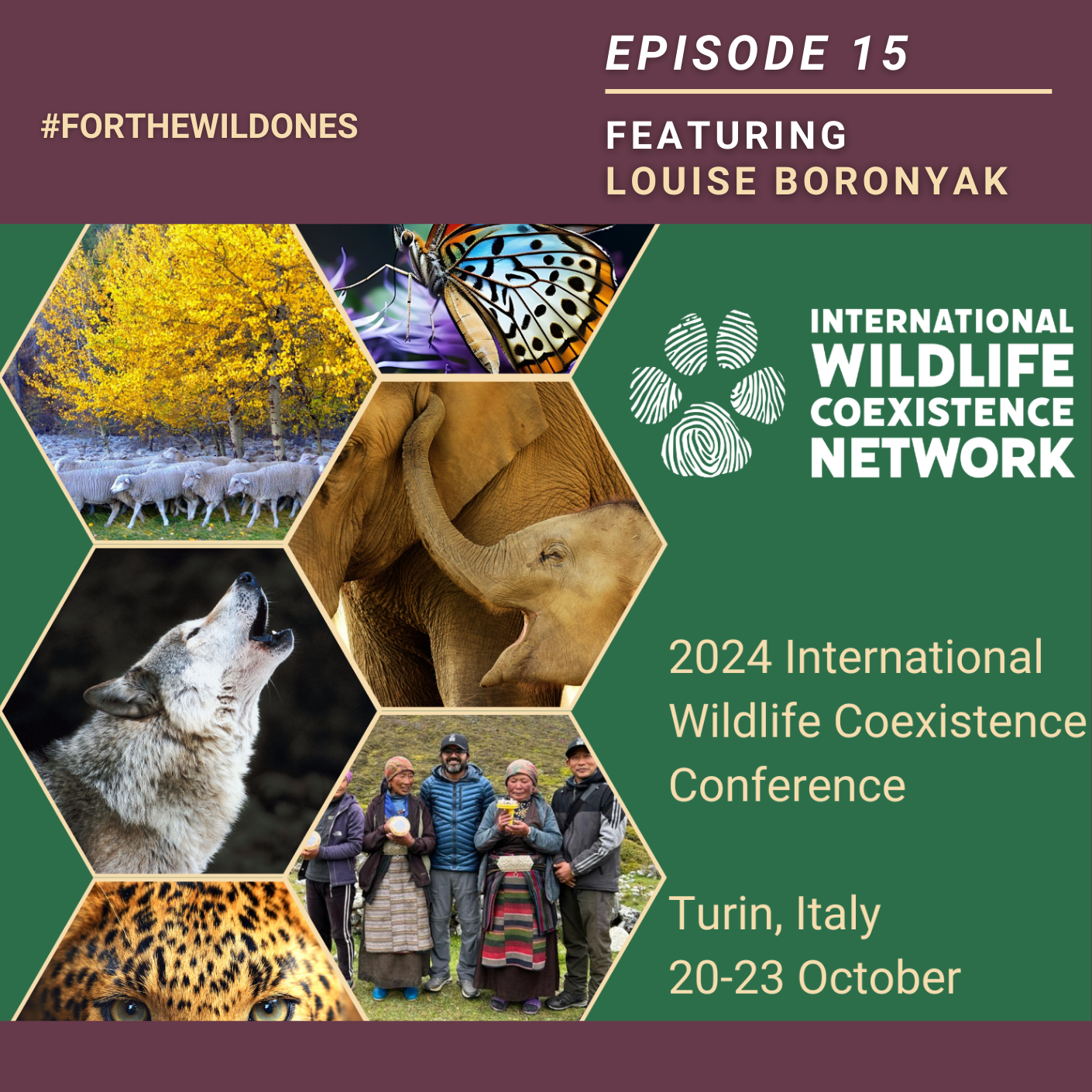Episode Transcript
Host 00:00:28 Welcome to another episode of For the Wild Ones. I'm your host, Josh Adler for the Wild Ones is brought to you by the International Wildlife Coexistence Network. Thanks for all your support As we've launched this podcast out into the world, we've gotten wonderful feedback and we're excited to share more conversations with you. This episode's guest is Jay Dallas Gagel, who works tirelessly to improve the habitats and lives of iconic American species like bison, wolves, and grizzlies. As a coordinator between tribes, policymakers, and experts, Dallas works to bring together communities and overcome gaps in order to form lasting solutions. Two problems perceived as intractable. Where do you call home?
Guest 00:01:57 I'm in Boise, Idaho. I'm calling that home. I've been here since 1986. I moved from my reservation up in northeastern corner of Montana, the Fort Peck, SBO and Sioux Reservation. I'm Yankton Dakota, and I worked for my tribe as a scientist before moving to Boise. So I call Northeastern Montana. Well, I kind of claimed the whole state. I lived all over Montana, went to school in Bozeman, so Montana's home, I don't think I will ever return, but Boise is like rapidly becoming primary home, but I, I can still consider it second home.
Host 00:02:41 Do you feel like you still have strong ties in Montana?
Guest 00:02:45 Well, I have strong ties to, to the land where I grew up and to, you know, traditional ways. I was back in Poplar, you know, I just walked into the tribal office and it just feels like home and I have strong connections. I walked into the tribal chairman's office and you know, he welcomed me with a big smile and a handshake. Hey, Dallas, it's been good to see you. However, I would, I will say, when I was working for the tribe in the early eighties, there was no four-legged wildlife to be seen on the reservation. And I worked with a friend in the environmental office. His name was Freddy Steel, and he noticed this too. And also he would notice if there was wildlife, what we might find is, uh, evidence of that at the landfill or somewhere, a deer carcass or something like that. And he went off after I left in the late eighties to form a fish and wildlife department within the tribal government, which is now quite huge and includes the Buffalo Project. I think they have half a dozen, uh, game wardens. And now I drive, there's a 22 mile distance between Wolf Point and Poplar. When I drive that road, I see deer all over the place and wildlife and coyotes. It's a positive thing that the tribe is managing their own wildlife.
Host 00:04:19 That's really exciting to hear that there's at least some kind of resurgence.
Guest 00:04:24 Yeah, yeah. I would drive and my job was, took me all over the reservation driving. I was running air quality monitoring stations. I wouldn't see a deer for a couple of years, and now I can see deer just about every day. I just drive the main highway.
Host 00:04:39 It sounds though that you were around nature as a child. Yes,
Guest 00:04:42 I grew up on, basically on a ranch. Um, sometimes Indians make the best cowboys, and we had a cattle ranch and farmed a number of acres. We ran about 400 head of cattle and on probably 25 to 30,000 acres, and we've probably farmed 15 or 20,000 acres, and my cousins are still running that operation.
Host 00:05:09 And so being out on the landscape, it must have influenced you. What was it that made you decide to go into science?
Guest 00:05:16 Well, I actually went to school for range science at M S U and I believed that, you know, I would learn what cows need and you know, how to supply their feed and do range management. And what happened in the end is that I ended up coming back to the reservation to take care of my grandfather and ended up getting a job with the Office of Environmental Protection for the tribe. Uh, I did every genre of environmental protection, and I also ran an air quality monitoring network for the tribe. There was a coal-fired power plant in Canada that we were monitoring for sulfur dioxide. We had a whole array of monitors in including acid rain monitors in the early eighties and telemetry monitors for integral vistas. That's what kind of was the turning point for me about environmental protection. And I never used any of my rain science background. I began to be an environmental protection advocate.
Host 00:06:23 And when did you get involved in wildlife advocacy? After
Guest 00:06:27 Moving to Idaho, I worked for the Department of Environmental Quality for about six years, and I ran the state's Air Quality Monitoring Network, realizing that working for government was not going, uh, in the direction that I wanted it as far as a stronger advocacy for environmental protection, um, for wildlife protection. And so I left the state, I became, uh, a lobbyist for the Idaho Conservation League, and that was in the mid nineties, essentially on into the two thousands when the Wolf Free introduction was something that was being considered for Idaho. I had been advocating for Wolf Free Introduction and some of the tribal people that I'd worked with at the Nez per tribe, who then later took over the reintroduction in the wolves for about 12 years, I'd already been working with them. And so I kind of just, uh, it was a natural fit to work on wildlife issues.
Host 00:07:28 Did you feel that it, at that time that you had a personal connection with wolves on the landscape? What was your interest in in seeing them brought back? Well,
Guest 00:07:37 I had a personal connection and just environmental health in general. Biodiversity, ecological health, the health of ecosystems depends on a balance in Native American terms. We, we term it natural law. Humans are not above natural law. We're, we're a part, you know, in many cases, natural law and the way the world works, the way the natural world works is outside of our control. From a Native American perspective, we've always known that the natural world and its balance is out of our control. I've had a connection with wolves because I know that they are one of the predators that that maintains that balance. I guess there's always been that natural connection. And I, I knew that wolves were beginning to come down from Canada into the United States. I happened to be backpacking in the Beartooth Absor wilderness in about 1992, and I saw a wolf way in the middle of the wilderness, and if you've ever seen a wolf in the wild, it's quite an amazing sight. And so at that point, I knew that this four-legged relative of mine needed to be back in some of its traditional territory in the lower 48.
Host 00:09:01 Maybe you could share a little bit more about the traditional notion of natural law. I feel like it's something that most people are interested to understand, but may be, are less acquainted with in the, the traditional context that you are.
Guest 00:09:19 The way that I was taught in, in traditional Dakota ways is that we honor and revere the natural world, but we also know that our livelihood and, and our wellbeing comes from the natural world. And so when we take from the natural world, we have to be very respectful. There's things that we do. So in a, in any particular ceremony, if you're going to harvest willows for a sweat lodge, let's say, which is a, a ceremony that, that we often do just to, just to sort of reconnect with our, our inner selves. We have to harvest the willows in a particular way. We have to ask for permission. May we take willows, and then we have to wait for the answer. 'cause sometimes the answer's no for whatever reason. Maybe it's a, a dry spring and we might need to look for willows in another location.
Guest 00:10:24 And if the answer is yes, then there's a element of reciprocity. We, we give back, we give an offering, whether that's tobacco or, or some something that we might value, but it's a pause. It's a pause and an honoring of the taking. And then we can harvest those willows. If we need to harvest the stones, the rock tribe, the stone people, for this ceremony, again, we have to ask permission. We have to wait for the answer. We have to give something back, an offering of gratitude. That's how I was raised. And I can, I try to follow those ways. Back in the nineties, I would hear about mudslides in California, lots of rain houses sliding off the hill. A lot of these things I wonder, you know, and from the native perspective, well, I wonder if, if there was that process was, did people ask permission? Were they to build in these high locations on, on unstable ground, on in the, in the foothills? Did they wait for an answer? Was there reciprocity? Was there a sense of humility that were part of the natural world as opposed to above it? Those are the things that I look at through a Native American lens.
Host 00:11:50 When you were speaking about asking permission, a question about listening came up for me. I'm wondering if you can speak to how you've learned to listen for that answer from nature. Maybe there's an ecological or kind of scientific explanation, but probably that's only part of the process.
Guest 00:12:12 I think the listening occurs when there's that connection. It feels to me like when we prop ourselves up on chairs hundreds or thousands of years ago, we've removed ourself one step from sitting on the earth and being close and having that connection. The more that we remove ourselves from the earth, the more that our listening ears begin to come become a little deaf. That's part of the process is asking permission and then, you know, waiting for the answer. The answer isn't given in just terms it isn't, we don't get an email or a memo. There was a wood stove program with Department of Environmental Quality in Idaho. So we had scientific basis for making some determinations on when to call a burn ban in the winter when the valley is socked under an inversion and the pollutants are, uh, trapped in the valley. And those conditions were numerical and scientific when they take the temperature soundings with the balloons, if there was a, a hot air mass above causing the inversion and that hot air mass was predicted to be stable and in place for 24 hours plus the pollution load in the valley was to reach a certain number or 110, I think it was for at the time.
Guest 00:13:38 Then we would have to call the burn band to decrease pollution and wait for, uh, a low pressure system to push the hot air mass out of the valley and release the inversion. Well, on one morning there was a 24 hour predicted stable air mass, an inversion, and our particulate loading numbers were at 1 0 8 rather than one 10. What do we do? I used to drive to work at about five in the morning to collect this data from the remote monitoring stations, but I would also look outside knowing that I was gonna have to make some sort of decision. Are the, you know, are the birds singing? Are they not singing? What does the weather look like? How does it feel? What senses are my body, is my body picking up? And in that particular case, we did call the burn ban of wood stoves, and I think it was the right thing to do. You know, I'm not gonna tell my science friends my meteorologists that I worked with, that I used some anomalous data points from the center of my being by just observing and trying to listen to what nature might provide.
Host 00:14:49 That brings up this question of the challenges of making balanced decisions that are, are not purely rationalistic in a world that is operating on this platform of optimization efficiency. These are the values that western culture puts on a mantle often. I'm I'm asking what are the challenges of working with, uh, a culture that doesn't know how to process values other than let's say data or statistical values? How do you achieve goals that maybe are more complex than, than a western mindset knows how to translate
Guest 00:15:38 As a scientist? For me, it's always been a huge challenge to know that the, the colonial mindset and the capitalist structure, uh, that we have to move and function within, uses empirical data to the exclusion of nearly every other kind of data, let's say. And what I look at is, is science has evolved, and if I look at traditional science or at least traditional science, as I understand it from my ancestors, the stories that we pass down are pieces of data. But these stories come from often a scientific basis. The scientific basis that these stories were produced in was a science of observation. Now, in our post-colonial, in our post-industrial postmodern age, data has become the, the end all and be all of our science. And that science because of that then has evolved into a science of experimentation. So you can poke and prod a thing in a particular situation with a particular set of constants, and then you can predict the result.
Guest 00:17:06 You have this, this hypothesis or theory that you're trying to prove. And then what you end up proving is, yes, in this container we've set up, we can expect this result. That wasn't where traditional science came from. The container that traditional science used was the natural world. Again, as science has evolved into experimentation and is left the observation piece, of course they're always observing, but they're observing under those certain conditions and often those certain conditions isn't the natural world. And so that's, that's always been the challenge for me is to try to bring in the storytelling and where those stories came from and how they originated and how, uh, we understood that this particular root was a healing root because we watched the bear who has a healing spirit, a healing archetype, dig that root and use it for themselves to heal themselves. We watched the bear when they're coming out of hibernation, go to another particular root that reinvigorates and restarts their immune system every spring after they've emerged from the den.
Guest 00:18:29 And we realized that that route had some value. And that's all from observing the natural world. Now you can prove that scientifically and many biologists do, but it feels like modern science is now finally catching up with traditional science, and we're understanding that these things are connected. Yes, the trees talk to one another, native people around the world, indigenous people have known that for centuries. Modern science is catching up to these things that were common knowledge 500, a thousand years ago. And so the more that we elevate this traditional ecological knowledge, the more that those, the keepers of that wisdom, the storytellers of that wisdom are at the decision making tables as opposed to just simply the empirical scientists, the better off we're going to be for the future. I think,
Host 00:19:34 I love how you're painting a picture of the overlaps between storytelling and science as well as how people come together around these human tools for understanding, for decision making. It's so important to me what you're saying about how modern science has gone through a period of development or, or developed in this sense of being in a vacuum or living in a vacuum, whereas traditional thought, traditional understanding, wisdom, knowledge was developed through observing all the complexity, interacting as well as being part of a place being embedded in our world. People who live within colonialist capitalist society are waking up to the understanding that we are not the only intelligence on this planet. And in fact, we've always lived within a shared earth full of intelligence, full of understanding, full of wisdom. If only we take the time to stop, observe, listen, feel, be a part of it, engage with it.
Guest 00:20:56 This idea that the two leggeds are separate from the natural world as opposed to the two leggeds are actually a part of and embedded in the natural world. And where all of our origins come from, we were all tribal at some point everywhere across the globe. We were all living very close to the earth. And so the challenge that we face is remembering those stories of when we lived close to the earth and shifting not only our thinking, but our actions as individuals, going back to that time of living close to the earth. We are living close to the earth when our food comes from 20 miles away instead of 2000 or 200. When we understand that that is an important way to live close to the earth, we have a chance of changing and repairing some of the damage that we are currently keenly aware of.
Guest 00:22:05 And that's a huge paradigm shift. That is the biggest paradigm shift, I think, of western culture and colonial mindsets that we could possibly try. I know that many years ago, either smoking was a commonplace thing in the thirties, forties, fifties, sixties even, and now we've had a cultural paradigm shift that recognizes the harm that smoking cigarettes causes. We've had a paradigm shift around that. That is the type of paradigm shift that we're needing to look at. But the harm we've caused is global. And so our shift needs to be similarly global in everything we do and how we think about the way in which we are a part of the natural world and how we can live within the natural world without excess. Um, I'm gonna beat up capitalism a little bit, but it's the capitalist excess that I think we're up against. If we're living closer to the earth and we're, and we're happy and healthy and we're making this this shift, I don't think we need the ex the excess. I think we would, it seems like we would be less stressed out about the future.
Host 00:23:30 There certainly is research that points to our brain's ability to relax, find relief, comfort in being in natural settings more than in front of a screen. We're sitting at a desk. We really didn't evolve to spend so much of our attention or time doing these, these things.
Guest 00:23:55 Mm-hmm. <affirmative>, you can get on the internet and, and find any number of forest bathing, walking meditations where it, it feels like our culture is hungry for some relief from this, from the stress of, of wondering if we're, are we going to continue as a species? And where they're finding comfort is in is back into nature. I guess if we, if we can make that shift, if we can just continue to, I guess just witness that when I do go into the forest and do a little forest bathing for 20 minutes, my stress level goes down. We can use empirical data to prove that if we need to, but I think it's probably self-evident for most of us.
Host 00:24:49 One widespread traditional story around the kind of paradigm shift that you're referencing has to do of a story of that when the bison is on its last legs, the people of all cultures will come together to save our planet's life. Is that a story that you're familiar with?
Guest 00:25:10 Yeah. And then a lot of it is credited with, um, crazy horse's vision. And, you know, there's different ways to tell that story. We as humans have, have created myth and story since, you know, since our beginning. And with any story, with any myth, you know, there's an underlying truth and the underlying truth of when the bison is on their last leg, we will come together to, to save ourselves. The way that it's presented in Lakota Dakota terms is that there's four different colors of people, white, red, black, and yellow. And it is the job of the red skinned person, the red skinned tribe to lead in the, the teaching, the paradigm shift of living in right relationship with the natural world. That's our job. Each one of these colors of people in that story have a job to take care of the first four sacred gifts, earth, air, water, fire. And so it's the red person's job to take care of the earth, and we do so by emulating the bison and their struggles to remain. That's the way that these stories have been told to me. That's sort of the cliff notes of that.
Host 00:26:41 In terms of helping others live in right relation with nature, uh, I'm wondering a number of things. How do you feel it's going? How do you feel that we can do better or that others can help you?
Guest 00:26:55 I believe that we have to begin with ourselves. We have to go into our own internal worlds inside ourselves, looking at our positive attributes and looking at our shadow sides and doing some of the shadow work individually. It balances out the positive and the light. And so as we begin to do that as individuals and continue that path, we then connect with community. We do internal work, we create community with one another, and then we help one another understand that we are part of the community of the natural world. And that's where I think that's gonna be the biggest leap.
Host 00:27:44 Do you witness people taking that leap around you in your communities?
Guest 00:27:49 Yes and no. Part of this work is to, is to wake up. And I see it when people are awake, the people that are striving to look for quiet places, that are striving to meditate, to do forest bathing, to to walk. I see that community growing. I see it being very strong. I see 'em connecting with one another, but I also see people hiking with headphones on and music and unaware of their surroundings. And they're not at that place of making community with the natural world. I think there'll be a tipping point. Those of us that are trying to make community with the natural world as well, will need to make community with, with, uh, you know, my neighbor on his mountain bike with his headphones on, talk to him about his experience and what did he notice when he's out riding? I see a, an, a resurgence of the idea of the natural world as part of our community. And then I also see, I see a lot of folks on mountain bikes with headphones.
Host 00:29:01 What would be some of your top advice for creating community with the natural world?
Guest 00:29:07 I believe I would start with where your food comes from, a little flower box in your Chicago apartment where you're growing maybe basil and, and sage for your food. Understanding that there might be a farmer's market where you live and checking that out, understanding where your food comes from. That would be, I think that'd be the first place to start. We seem to be very insect diverse. And another thing that I I think is important is to, is to understand that the insects have a function. A lot of my neighbors are upset with the sugar ants that are crawling around on their counters. Often ants are in the top five of pollinators, and we're gonna need those pollinators 'cause our, you know, we're losing vegetation species rapidly. So just the things we can do in our homes and, and looking at where our food comes from is, I think, hugely important.
Host 00:30:10 Yeah, it's, it's true that the international market aspect of food, agriculture creates all this expansion and duress on natural systems. So I just have one final question, which is more of a big picture question. Going back to this notion of our shared earth, which in a traditional mindset is where we've always lived, is the only mindset that we've known. Would you be able to share your vision of our shared earth now as well as maybe looking forward a little bit, one or two generations, how we might be able to live in more right relation with nature and closer once again to our home?
Guest 00:31:02 That's a big question. Often I hear my native elders and, and people talking, some of the stories that I have been passed down is as colonial settlers began to colonize North America and, and sweep across the landscape out west, they called it the wildlands or the wilderness. And, and then sooner or later under they realize that they needed to protect some of this. And so now they're called wilderness areas in an, in the native sense, it was, it seemed backwards and confusing because this place where we live is loving and caring and giving and sustains us. And it wasn't until, from a Dakota perspective, the white settlers came out west. Did it become wild <laugh>? Um, it was, it was my ancestors' home, and it was, it was tame and, and loving. It didn't become wild until there was a different way of looking at it.
Guest 00:32:12 And that way of looking at it, it was wild and foreboding. And that's not how my ancestors lived with it. And that's just setting this whole paradigm shift, I guess, on its end is that, that's where we need to get to, is this is a very loving, giving and generous planet. We disqualify ourselves from managing it. If we decide that we need to take too much without reciprocity, without humility, without asking permission, looking forward to the future, you know, I would love to see and, and be able to just have conversations with my local community, my neighbors, my, my global online community, sharing those concepts. Yeah, I went for a walk and, and I could connect and I could feel the natural world talking to me. I could sense things that I had not sensed before. I found a beautiful stone. I asked permission to take it. I gave something back. I was humble. I took my earbuds out and connected with the natural world and appreciate it for what it is, as opposed to just looking at it as a place to take. And if the a generation or two from now are in that mindset, then I think we'll have succeeded
Host 00:33:41 As colleagues at I W C N. I feel so fortunate to be working with Dallas every day. He's an example of witnessing the power of what one person can accomplish. You've been listening to four the Wild Ones, brought to you by the International Wildlife Coexistence Network. Check our website, wildlife coexistence.org to find out the latest events, resources, and community around coexistence and keep a steady eye on our social media feeds. We've got an exciting lineup of guests you're not gonna wanna miss. Until the next episode, stay wild.
